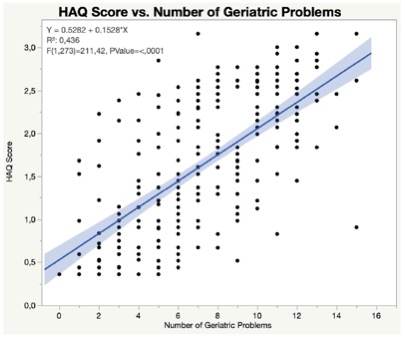Session Information
Date: Saturday, November 7, 2020
Title: Epidemiology & Public Health Poster II: OA, Osteoporosis, & Other Rheumatic Disease
Session Type: Poster Session B
Session Time: 9:00AM-11:00AM
Background/Purpose: Current demographic data predict that the number of older adults with rheumatic diseases will considerably increase in the coming years. Geriatric patients differ from younger adults in many ways including their clinical presentation, co-morbidities and response to medication. The management of such patients is often challenging due to the presence of multimorbidity, polypharmacy and geriatric syndromes (i.e. conditions in which symptoms result from impairments in multiple systems rather than a discrete disease). To systematically
assess geriatric patients, specific tools have been developed; however, they are not routinely utilized by rheumatologists. Using these tools could improve patient management and satisfaction in rheumatologic care. The aim of this study was to examine the prevalence of 17 common geriatric health problems using validated geriatric assessment tools in older patients with rheumatic and musculoskeletal diseases.
Methods: Adults 65 years and older who presented to a tertiary rheumatologic hospital were included after informed consent. All patients recruited were assessed using the MAngable GeriatrIC Assessment (MAGIC) which addresses 14 common geriatric health problems. In addition, polypharmacy (≥ 5 medication), muscle function using the Short Physical Performance Battery and frailty applying the Fried definition were assessed. Disability was quantified with the “Funktionsfragebogen Hannover” (FFbH), a validated tool for patients with rheumatologic diseases that can be easily converted to Health Assessment Questionnaire (HAQ) scores. Primary outcome was the frequency of the selected 17 geriatric health problems; the correlation of the total number of problems with HAQ scores was a secondary outcome.
Results: Of the 300 individuals included 67% were female with a mean age of 73±6.6 years; 85% ( > 50% with rheumatoid arthritis) had a rheumatologic diagnosis. The remaining participants had either a chronic pain syndrome or degenerative joint/spine disease. On average participants had 7 out of 17 assessed geriatric problems. Females had more such problems than males (8 vs. 6, p< 0.0001). Chronic pain and polypharmacy were most common but several others were also seen in more than 50% of patients (see Table). The mean HAQ Score was 1.67±0.79. There was a positive correlation (see Graph) between the number of problems and the HAQ Score (R2 0.44, p< 0.0001).
Conclusion: A systematic geriatric assessment can be successfully used to discover and quantify geriatric health problems in older patients with rheumatic and musculoskeletal diseases. These problems appear to be very common and importantly, patients with more problems had poorer functional status. Frailty, depression, incomplete vaccination status, cognitive impairment or polypharmacy are all known to negatively impact patient care. Recognizing and addressing geriatric problems has the potential to lead to health care improvements including adherence and medication side effects and might increase patient satisfaction and
functional status independent of disease activity.
 Table 1: Frequency of Geriatric Problems
Table 1: Frequency of Geriatric Problems
 Figure 1: Relationship of Number of Geriatric Problems and Health Assessment Questionnaire (HAQ) Score. A significant linear relationship was found between the number of geriatric problems and HAQ score indicating that a higher number of geriatric problems is associated with greater difficulty in daily function
Figure 1: Relationship of Number of Geriatric Problems and Health Assessment Questionnaire (HAQ) Score. A significant linear relationship was found between the number of geriatric problems and HAQ score indicating that a higher number of geriatric problems is associated with greater difficulty in daily function
To cite this abstract in AMA style:
Buehring B, Berrisch A, Andreica I, Tsiami S, Kiefer D, Kiltz U, Baraliakos X, Braun J. Systematic Geriatric Assessment in Older Patients with Rheumatic Diseases – The RheuMAGIC Pilot Study [abstract]. Arthritis Rheumatol. 2020; 72 (suppl 10). https://acrabstracts.org/abstract/systematic-geriatric-assessment-in-older-patients-with-rheumatic-diseases-the-rheumagic-pilot-study/. Accessed .« Back to ACR Convergence 2020
ACR Meeting Abstracts - https://acrabstracts.org/abstract/systematic-geriatric-assessment-in-older-patients-with-rheumatic-diseases-the-rheumagic-pilot-study/
